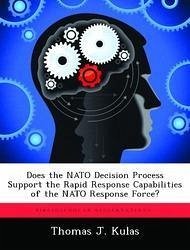Nicht lieferbar

Crisis Advance Planning and Force Capabilities Integration: Enabling Rapid Global Mobility by Accelerating the Deployment Process
Versandkostenfrei!
Nicht lieferbar
As a result of the reduction in overseas U.S. forces at a time of global instability, theU.S. military has transformed to a home-based expeditionary force, highly dependent onrapid deployment to project force abroad in response to crisis. Effective response tocrises demands rapid, decisive force projection in order to reduce loss of life, mitigate the after effects of disaster such as the spread of disease, and ensure success against our more hostile adversaries in time of war. Rapid force projection demands pre-deploymentplanning processes that are timely and flexible. Unfortunately, the curr...
As a result of the reduction in overseas U.S. forces at a time of global instability, theU.S. military has transformed to a home-based expeditionary force, highly dependent onrapid deployment to project force abroad in response to crisis. Effective response tocrises demands rapid, decisive force projection in order to reduce loss of life, mitigate the after effects of disaster such as the spread of disease, and ensure success against our more hostile adversaries in time of war. Rapid force projection demands pre-deploymentplanning processes that are timely and flexible. Unfortunately, the current predeploymentprocesses are neither rapid nor flexible enough to effectively respond to crises. Moving potentially tremendous amounts of personnel and equipment fromCONUS bases, demands more efficient, effective planning tools and processes. To facilitate changes to the deployment process, senior leadership has set a timestandard for development and validation of a TPFDD force flow for the first seven daysof a crisis within 72- hours. The USJFCOM J4 JDPO division has identified severalprocess improvement areas to meet the 72-hour time standard. Key among them is theJoint Force Capabilities Register, a capabilities-based tool for deployment planning. This graduate research project addresses the current joint planning process,problems with the current process, the 72-hour objective time standard, the benefit ofadvance planning for crisis, and the merits and challenges of the USJFCOM Joint ForceCapabilities Register.










